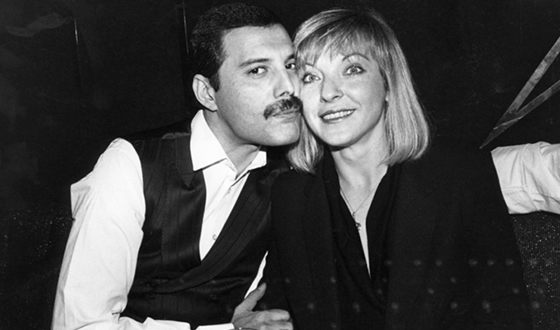

In the early 1970s, Mercury had a long-term relationship with Mary Austin, whom he met through guitarist Brian May. He lived with Austin for several years in West Kensington, London. By the mid-1970s, he had begun an affair with a male American record executive at Elektra Records, and in December 1976, Mercury told Austin of his sexuality, which ended their romantic relationship. Mercury moved out of the flat they shared, into 12 Stafford Terrace in Kensington and bought Austin a place of her own nearby. They remained close friends through the years, with Mercury often referring to her as his only true friend. In a 1985 interview, Mercury said of Austin, "All my lovers asked me why they couldn't replace Mary [Austin], but it's simply impossible. The only friend I've got is Mary, and I don't want anybody else. To me, she was my common-law wife. To me, it was a marriage. We believe in each other, that's enough for me." He also wrote several songs about Austin, the most notable of which is "Love of My Life". Mercury's final home, Garden Lodge, 1 Logan Place, a twenty-eight room Georgian mansion in Kensington set in a quarter-acre manicured garden surrounded by a high brick wall, had been picked out by Austin. In his will, Mercury left his London home to Austin, rather than his partner Jim Hutton, saying to her, "You would have been my wife, and it would have been yours anyway." Mercury was also the godfather of Austin's oldest son, Richard.
During the early- to mid-1980s, he was reportedly involved with Barbara Valentin, an Austrian actress, who is featured in the video for "It's a Hard Life". However, in another article, Valentin was "just a friend", and Mercury was really dating German restaurateur Winfried Kirchberger during this time. By 1985, he began another long-term relationship with hairdresser Jim Hutton (1949–2010). Hutton, who was tested HIV-positive in 1990, lived with Mercury for the last six years of his life, nursed him during his illness, and was present at his bedside when he died. Hutton said Mercury died wearing the wedding band that Hutton had given him.
In October 1986, the British press reported that Mercury had his blood tested for HIV/AIDS at a Harley Street clinic. A reporter for The Sun, Hugh Whittow, questioned Mercury about the story at Heathrow Airport as he was returning from a trip to Japan. Mercury denied he had the disease. According to his partner Jim Hutton, Mercury was diagnosed with AIDS in late April 1987. Around that time, Mercury claimed in an interview to have tested negative for HIV. Despite the denials, the British press pursued the rampant rumours over the next few years, fuelled by Mercury's increasingly gaunt appearance, Queen's absence from touring, and reports from former lovers to various tabloid journals. By 1990, the rumours about Mercury's health were rife. At the 1990 Brit Awards held at the Dominion Theatre, London, on 18 February, a visibly frail Mercury made his final appearance on stage when he joined the rest of Queen to collect the Brit Award for Outstanding Contribution to Music. Towards the end of his life, he was routinely stalked by photographers, while The Sun featured a series of articles claiming that he was ill; notably in an article from November 1990 that featured an image of a haggard-looking Mercury on the front page accompanied by the headline, "It's official – Freddie is seriously ill."
After the conclusion of his work with Queen in June 1991, Mercury retired to his home in Kensington, west London. His former partner, Mary Austin, had been a particular comfort in his final years, and in the last few weeks of his life made regular visits to his home to look after him. Near the end of his life Mercury was starting to lose his sight, and he deteriorated to the point where he could not get out of bed. Due to his worsening condition, Mercury decided to hasten his death by refusing to take his medication and continued taking only painkillers.
On 22 November 1991, Mercury called Queen's manager Jim Beach over to his Kensington home to discuss a public statement, which was released the following day:
Following the enormous conjecture in the press over the last two weeks, I wish to confirm that I have been tested HIV positive and have AIDS. I felt it correct to keep this information private to date to protect the privacy of those around me. However, the time has come now for my friends and fans around the world to know the truth and I hope that everyone will join with me, my doctors and all those worldwide in the fight against this terrible disease. My privacy has always been very special to me and I am famous for my lack of interviews. Please understand this policy will continue.